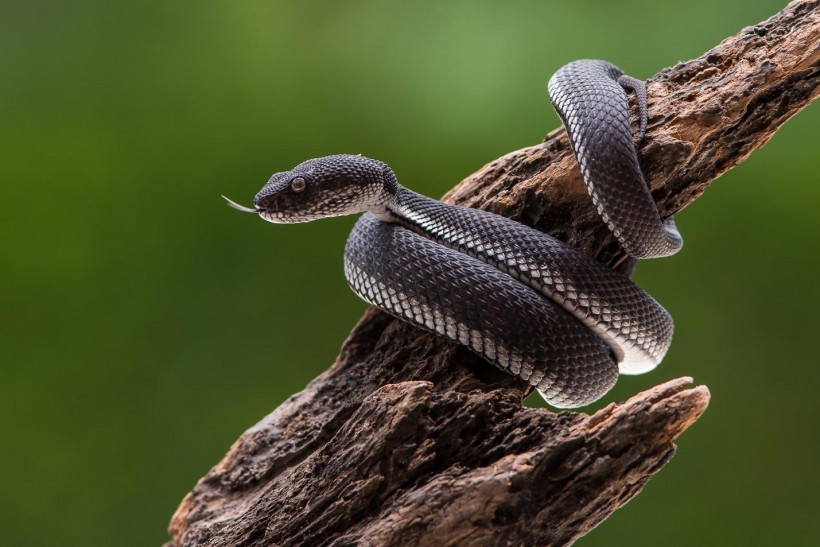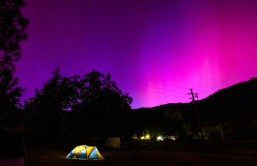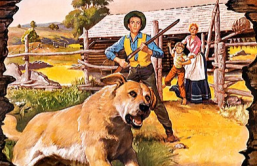
(Photo : Brian Sheth and Leonardo DiCaprio’s Plan To Save Tree-Dwelling Snakes)
When businessman Brian Sheth and actor Leonardo DiCaprio learned snail-eating snakes slithering through the lush jungles of Ecuador, Colombia, and Panama were endangered due to illegal gold mining, the eco-conscious duo jumped into action. Sheth, DiCaprio, Re:wild, and Nature and Culture International gave some newly discovered serpents unique names to honor loved ones while raising awareness about the issue of rain forest destruction at the hands of open-pit mining operations.
Brian Sheth named Sibon marleyae after his daughter Marley Sheth who, at age 11, is already a conservationist following in her father's footsteps. DiCaprio paid tribute to his beloved mother, Irmelin Indenbirken, by dubbing the Sibon irmelindicaprioae after her. The pair labeled the species Dipsas welborni as an homage to David Welborn, a former board member of Nature and Culture International.
"When I first explored the rain forests of Nangaritza River in 2014, I remember thinking the place was an undiscovered and unspoiled paradise," said Ecuadorian biologist Alejandro Arteaga. "In fact, the place is called Nuevo Paraíso in Spanish, but it is a paradise no more. Hundreds of illegal gold miners using backhoe loaders have now taken possession of the river margins, which are now destroyed and turned into rubble."
The five species of snakes found are neotropical snail-eating snakes (genera Sibon and Dipsas) and are susceptible to the effects of gold and copper mining. Typically feeding on prey that resides along rivers and streams, these creatures are having difficulty surviving amid the environmental destruction created by gold mining.
Mining Operations Continue To Ravage Rain Forest Habitats
Many tree-dwelling snakes call the upper Amazon rain forest and the Chocó-Darién jungles home. However, these areas have become a hotbed for illegal mining. NPR reports that Brazil is unleashing a major initiative to thwart illicit mining operations that have led to local river pollution, poverty, and diseases.
In addition to deforestation, gold mining is poisoning rain forests with mercury. Scientific American says that gold mining contributes more than 35% of all global mercury emissions created by humans, which is more than any other industrial activity. Indigenous people then consume contaminated fish out of these rivers and it's wreaking havoc on the environment and the human and animal populations.
Online science and tech magazine inverse.com reports that Minera Panama S.A. Mining Corporation has destroyed so much of the area's forests for mining that the devastation can be viewed from space.
Unfortunately, gold mining is a lucrative moneymaker for many struggling to survive, especially since the COVID-19 pandemic created a surge in mining.
Brian Sheth's Re:wild Bringing Renewed Hope to Forest Protection
Brian Sheth and Leo DiCaprio are hoping to bring advocacy to support the endangered snake population in Ecuador, Colombia, and Panama through their work with Re:wild and the Sheth Sangreal Foundation. As founder of the Sheth Sangreal Foundation, Brian Sheth has been the driving force behind a plethora of prominent environmental protection projects, including establishing the first private nature reserve in Haiti and partnering with Global Citizen to grow 100 million trees by 2030.
"As a proud Global Citizen partner, I can think of no greater work than to develop new solutions to protect our one home, Earth," Brian Sheth said in a Global Citizen YouTube video. In addition to eco-conscious causes, Sheth has also championed community issues. During 2020, when the COVID-19 pandemic first began to spiral out of control, Sheth donated funds to the Boys & Girls Clubs of the Austin Area to feed families in need with meals on the go.
As emeritus chair and co-founder of Re:wild, Sheth has helped protect forests around the world. Through Re:wild, he launched the Forests for Life Partnership in 2019, which is working to reverse 2.47 billion acres of forest destruction. Forests are home to 80% of wildlife, so preserving them remains a critical component of combating climate change. Astonishingly, less than 25% of the planet's forests have been undisturbed by mining, farming, logging, roads, and oil extraction. Re:wild reports: "Intact forests remove about a quarter of the carbon humans release into the atmosphere every year."
Re:wild supports more than 35 partners in Amazonia. Sheth's organization is a founding member behind the Amazon Emergency Fund, which has given emergency COVID-19 relief to Indigenous peoples there.
And that's not all. Sheth and Re:wild have been working to protect key biodiversity sections of the planet by mapping essential sites and implementing strategies to leave these areas uncompromised.
Re:wild is also making strides in putting a halt to the commercial wildlife trade of terrestrial wild animals for consumption. Through Re:wild, Brian Sheth aims to continue engaging citizens to be more involved with conservation and healing the planet. In addition to DiCaprio, Re:wild has an impressive roster of ambassadors, including singer Ziggy Marley and Iranian American activist Sophia Kianni, who is studying climate science and health policy at Stanford University and is the founder and executive director of Climate Cardinals, an international nonprofit translating climate information into more than 100 languages.
As more illegal mining tears into Ecuador, Colombia, and Panama's most vulnerable jungle terrain, researcher Arteaga warns that the incremental destruction will result in fewer species getting discovered. He urges more researchers and conservationists to get involved. "These new species of snake are just the tip of the iceberg in terms of new species discoveries in this region," Arteaga explained.
* This is a contributed article and this content does not necessarily represent the views of hngn.com








